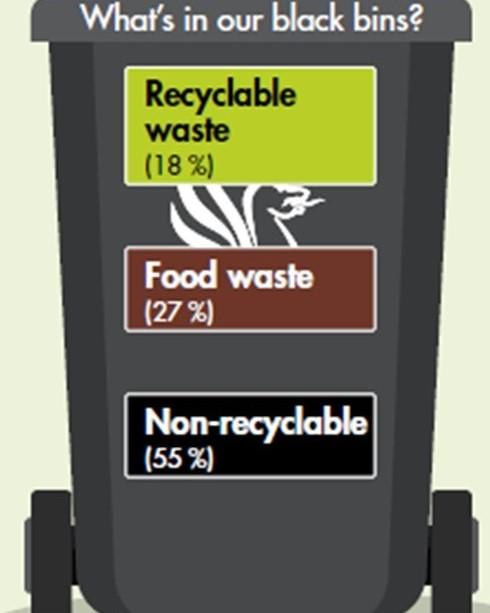The move to three-weekly black bin collections would be in line with the council’s Recycling and Waste strategy, which aims to reduce non-recycled waste and reach a recycling rate of at least 70 per cent by 2030. This would significantly reduce the annual carbon emissions and costs associated with collecting and treating waste in North Somerset.
The council introduced weekly kerbside recycling collections of a wide range of materials including food waste in 2010. However, an analysis of the waste North Somerset households put in their black bins found that almost half (45 per cent) could have been recycled.
Last year households in North Somerset generated a total of approximately 90,000 tonnes of waste, 40,000 tonnes of which was put in black bins. 18,000 tonnes of this could have been recycled instead, cutting emissions and saving money.
Treating and disposing of black bin rubbish costs local council tax payers around £130 per tonne. North Somerset Council’s separated kerbside recycling collections result in a high quality of recycling material, which can be sold and made into new materials. This generates an income of around £30 per tonne.
Several other local councils in the south west have already successfully made the switch to three-weekly non-recyclable rubbish collections, including Somerset, East Devon, and Mid-Devon. All have seen an increase in recycling rates, a reduction in non-recyclable waste, and a financial saving.
Cllr Annemieke Waite, North Somerset Council’s executive member for climate, waste and sustainability, said: “We want to make North Somerset a thriving and sustainable place, and we know many people are supportive and enthusiastic about recycling as much as possible, putting out their sorted recycling, including food waste, each and every week.
“This year, we will need to spend around £5 million to dispose of black bin rubbish. Almost half of this waste could instead be recycled and generate an income to help pay for vital local services.
“North Somerset residents already do a lot of hard work to recycle but it’s important we do more. Not only will that save council tax payers’ money, it will also help protect our environment. We’re also keen to introduce the collection of soft plastics, such as crisp packets and vegetable packaging, to help local people recycle more.
“We know there will be some households in North Somerset where a three-weekly black bin collection may not work. Our proposed public consultation will be an opportunity to understand the feasibility of these changes for people, particularly around any concerns about storing and dealing with waste.”
Of the total waste put in black bins, over a quarter (27 per cent) was food waste, and almost half of this was unopened food still in its packaging. As well as being a waste of natural resources, it’s very important that food waste is disposed of correctly, to prevent the harmful climate change gas methane being released.
The waste analysis also found that 18% of black bin rubbish could have instead been recycled using the council’s kerbside collections. The materials currently collected each week in North Somerset includes paper, cardboard, cartons, textiles, batteries, metal, glass, electrical items, hard plastic packaging and food waste.
As part of any change, the council would aim to introduce the collection of soft plastics, such as crisp packets and vegetable packaging, as part of its weekly kerbside recycling service, to help residents recycle more.
If North Somerset Council’s Executive decides to carry out the proposed public consultation into the introduction of three-weekly black bin collections, residents will be asked about how much they currently recycle, and how the service could be improved to make it easier to recycle more. The report containing the proposals is at https://n-somerset.moderngov.co.uk/ieListDocuments.aspx?CId=152&MId=1069.
Final proposals for the three-weekly black bin collection service will be based on the feedback from the proposed public consultation, and will return to the Executive for decision this summer 2024.
